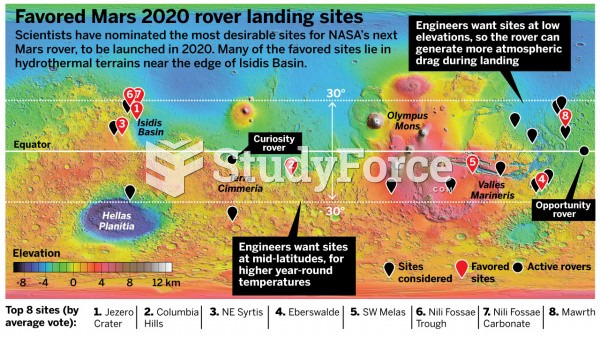Answer to Question 1
During the Noachian Period, Mars was battered by heavy bombardmentthe last of the debris in the young Solar System. The old southern hemisphere survived this period. The largest impacts blasted out the great basins like Hellas and Argyre very late in the cratering, and there is no trace of magnetic field in those basins. Evidently the dynamo had shut down by then.
The Noachian period included flooding by great lava flows that smoothed some regions. Volcanism in the Tharsis and Elysium regions was very active, and the Tharsis rise grew into a huge bulge on the side of Mars. Some of the oldest lava flows on Mars were in Tharsis rise, but it also contained some of the most recent lava flows. It was evidently been a major volcanic area for most of the planet's history.
The valley networks found in the southern highlands were formed during the Noachian period when water fell as rain or snow and drained down slopes. To keep the water in its liquid phase, it required a higher temperature and higher atmospheric pressure than presentday Mars. Violent volcanism could have vented gases, including more water vapor that kept the air pressure high. This may have produced episodes in which water flowed over the surface and collected in the northern lowlands and in the deep basins to form oceans and lakes, but it's not known how long those bodies of water survived. A planetwide magnetic field may have protected the atmosphere from the solar wind.
Answer to Question 2
True plate tectonics are apparently not important on Venus. Although measurements by lander probes show that the surface rock on Venus is the same kind of dark-gray basalt found in Earth ocean crust, they also reveal that the crust is very dry and therefore about 12 percent less dense than Earth's crust. Venus's low-density crust is more buoyant than Earth's crust and would resist being pushed into the interior. Also, model calculations indicate that water embedded in rocks is needed to lubricate plate motion, so Venus's dry crustal rocks would not slide past each other easily. Finally, Venus's crust is so hot that it is halfway to its melting point. Such hot rock is not very stiff, so it cannot form the rigid plates typical of plate tectonics on Earth. Planetary scientists hypothesize that the low density, dryness, and pliability of Venus's crustal rocks are the reasons that planet lacks plate tectonics.
Venus also lacks linear mountain chains, has very few folded mountain belts, and has widespread volcanic occurrences all of which would provide evidence for plate tectonics.







